Rating:




![]()
Stanley Kubrick’s A Clockwork Orange is a fantastic work of art that is violent and disturbing. It is a work of art that explores the concept of morality and whether a person can be forced to change their ways through a forced treatment rather than be given a choice. Kubrick provides us with a film that explores the world through the mind and eyes of a devious teenager named Alex DeLarge. No better representation of this is from the opening scene. As the opening scene is displayed, Alex appears with the expression of a conniving and villainous character. As the camera slowly pans out, he drinks a glass of milk as his buddies are shown as they sit in an erotic milk club. Alex’s voice is heard as his voice seems childish but speaks with a way of words that makes him seem more devious.
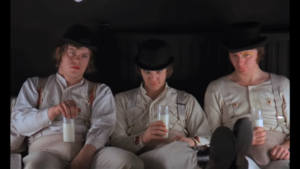
The story of A Clockwork Orange is the rise and fall of the teenager Alex DeLarge (Malcolm McDowell). The story is presented through the mind and eyes of Alex. In a futuristic Britain, late teen Alex DeLarge is the leader of a gang of delinquents that he calls them his “droogs.” Alex and his droogs commit acts of what they call ultra-violence without any care of concerns for their victims or anyone else they come across. These acts consist of violence against anyone, rape, and petty theft, and violence. Alex has an obsession with classical music, especially Beethoven. He listens to Beethoven during his acts of violence as it brings him pleasure and inspires him to commit whatever dangerous action comes in his mind. With his group, Alex rules with an iron fist and doesn’t tolerate any challenge to his leadership in any way, shape, or form. When Alex is finally arrested, he receives the option to participate in a program developed by the government that will reduce his time in jail. Alex becomes a guinea pig for a conversational experiment intended to curb the destructive impulses of men and solve society’s crime problems. As the treatment seems to work, Alex becomes helpless in dealing with the new violence that surrounds him in the new world he is introduced in.
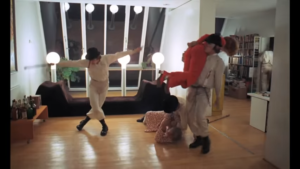
Kubrick displays a type of film mastery. He should be commended on his direction and cinematography as he blends the most unspeakable crime one can think of and somehow wrap it in a new display of art and sound through his own mind and interpretation. Don’t get me wrong, the acts that Alex and his hoodlum friends do are unspeakable and should be killed for it. Yet, once again, Kubrick somehow makes it seem brighter than it actually is. Kubrick shows his mastery of in-camera styles and pace with many of the scenes, especially in the first 20 minutes of the film. One example is when Alex and his droogs drive to the country home of writer F. Alexander where they beat him to the point of crippling him while raping his wife. The scene is downright horrendous to watch, yet you are drawn to it. Kubrick does this by bringing closeups of both Alexander as he is struggling for his life with a blend of bright colors and lighting during a genuinely dark scene. Kubrick adds a cherry on top of this despicable act by having Alex sing “Singin’ in the Rain.” A once-happy song that now has an evil meaning associated with it.
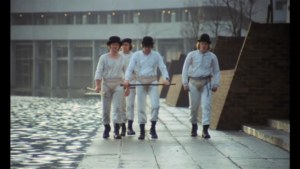
Another example of Kubrick’s brilliance is when Alex and his gang walk down the flat block marina. After Alex’s leadership is questioned and he gets advice from his droogs, the scene switches to the marina. The scene is beautiful down as it is in slow motion with a wide-angle showing all the characters. Kubrick continues this scene with Alex narrating his thoughts and saying that beautiful music played in his head as evil thoughts ran through it. Kubrick syncs this scene with parts of Gioachino Rossini’s “The Thieving Magpie.” As the music intensifies, Alex unleashes his rage against the group. Rather than speeding up the scene to real-time, Kubrick keeps everything in slow motion so you can see everything that is happening and not miss a single moment.
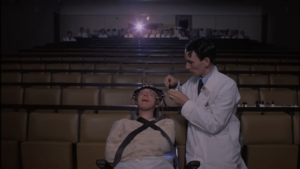
The major theme that Kubrick presents is whether aversion therapy can stop immoral behavior. Is a person a product of their society, and can they stop the tendencies that they have become a habit of becoming a good citizen? Kubrick displays this with Alex and the Ludovico technique. He is strapped to a chair, injected with drugs, and forced to watch films of sex and violence with his eyes forced open. The scene is quite brutal as Alex screams to be released and becomes nauseated as he recognizes his favorite composed will become a horror to him. After the aversion therapy, Alex behaves like a perfect citizen but not by choice. He becomes sick from the very thought of violence. He can’t fight back nor protect himself. Yet the question presented is whether this actually works. If society can be better off with criminals not being able to do acts of violence, would it be great for society? But with it, the idea of giving up the freedom of choice and is it really genuine make it a better society. Kubrick presents a great question on whether we are genuinely human, or are we robots going along with society.
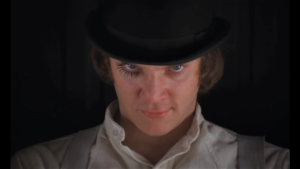
Malcolm McDowell’s performance as Alex DeLarge should be commended, and yet McDowell wasn’t even nominated for an Academy Award. One states that you should never judge a book by its cover, however when McDowell first appears on screen as Alex, my immediate thought was, “This muthaf***a is crazy and looks insane.” As the camera shows a sadistic looking Alex, with a distinct darker right eye and a bowler hat. His blue eyes seem charming but devious in ways you honestly wonder what he is thinking. You are looking in the face of a psychopath. McDowell plays Alex beautifully. He makes you genuinely get in the mind of a villainous person while showing how joyous crime, mayhem, and chaos could be. It’s like watching the teenage years of the Joker in his youth. Genuinely terrifying and yet intriguing all the way through. I commend you on your performance McDowell.
One must commend Kubrick on his use of classical music for this film. It truly enhanced the movie, but it seems like it is also a displacement. Alex is described as a Beethoven fan. He states his love for Beethoven many times in the film. Yet, Kubrick primarily uses Gioachino Rossini for most of the brutal scenes in the movie. Either way that Kubrick went with, the music is still a strong point of the film. One of the most terrifying things to consider is that he transforms Gene Kelly “Singin’ in the Rain” from a happy song to one of profound violence. It would make you second guess singing that song before anything else.
Adventuring through the mind of a sick teenager isn’t what I call a fun night. A teenager that is a true psychopath who believes that violence and mayhem is a way of life. Kubrick gives us a fascinating journey through a teenager’s mind and the world but shows us what happens when the mind is conditioned in a way that transforms a person into being a mechanical version in a world they have no choice but to be a perfect citizen. One might wonder, is this the path that society is on now. Would we give up our freedom of choice to be an ideal citizen without crime?